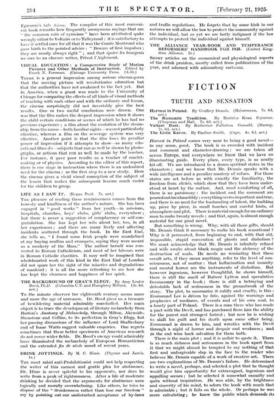To the minute observer the eighteenth century seems more and
more the age of unreason. Dr. Reed gives us a treasure of bewildering material admirably marshalled. Her main
object is to trace the development of literary melancholy from Burton's Anatomy of Melancholy, through Milton, Akenside, Shenstone and Collins, to its perfection in Gray's Elegy, but her passing discussions of the influence of Lord Shaftesbury and of Isaac Watts suggest valuable enquiries. One regrets sometimes that these better specimens of American research do not cover wider fields. Dr. Reed's energy could admirably have illuminated the melancholy of 'European Romanticism and the extended fin de si&le mood of recent years.










































 Previous page
Previous page